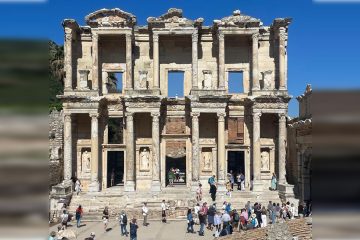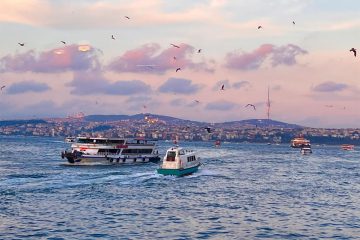Discover Istanbul, Gallipoli and Classical Anatolia
DAY 1 ISTANBUL ARRIVAL
DAY 2 ISTANBUL Guided Walking Tour
DAY 3 Gallipoli Battle Fields. Crossing by ferry to Çanakkale.
DAY 4 SELÇUK -Visit Troy ancient city later drive to Ayvalık for lunch break. Drive to Selçuk.
DAY 5 EPHESUS & COOKING CLASS- PAMUKKALE (Cotton Castle)
DAY 6 PAMUKKALE- HIERAPOLIS – ANTALYA
DAY 7 ANTALYA Perge Ancient City Free afternoon.
DAY 8 DEPARTURE
DAY 1 ISTANBUL ARRIVAL
Meet the group and transfer to the hotel. Stay at Istanbul
DAY 2 ISTANBUL Guided Walking Tour
Sultanahmet Square (Hypodrom), Sultanahmet (Blue Mosque) Mosque.
Throughout history, Istanbul, Turkey’s most populous city, has served as a cultural melting pot. Each civilization that settled in Istanbul left its stamp, resulting in a metropolis rich in world history. Istanbul is located between the Sea of Marmara and the Black Sea, with the scenic Bosphorus strait connecting Europe and Asia. Its strategic location as a port city and trade hub has elevated it to global prominence. We will visit the famous Blue Mosque also Sultanahmet Square, a treasure of Istanbul’s history, features three significant structures from the Roman and Byzantine eras: the Theodosius Obelisk, the Serpent Column, and the Walled Obelisk. These monuments are vital to Istanbul’s cultural heritage, showcasing unique architectural styles and the historical and legendary narratives they embody. Each monument represents a distinct period and event, providing visitors with glimpses into the past. In the afternoon free time . Stay at Istanbul.
DAY 3 Gallipoli Battle Fields. Crossing by ferry to Çanakkale.
Early departure from is İstanbul, we are heading to Gallipoli. At first light on 25 April 1915, Allied forces made their landing on the Gallipoli peninsula in what is now Turkey. The Gallipoli campaign was the ground component of a strategy aimed at enabling Allied vessels to navigate through the Dardanelles, seize control of Constantinople (present-day Istanbul), and ultimately force Ottoman Turkey to exit the war. During the visit we will stop at the commemorative site, Arı Burnu Cemetery, Lone Pine Cemetery, Turkish Cemetery 57th Regiment also at Chunuk Bair. After the visit we will have an epic ferry journey between Europe and Asia to Çanakkale. Stay at Çanakkale.
DAY 4 SELÇUK -Visit Troy ancient city later drive to Ayvalık for lunch break. Drive to Selçuk.
Troy is one of the most well-known ancient cities in the world. The 10 layers found in Troy represent over 3000 years of continuous history and let us trace the different civilizations that lived in this special area where Anatolia, the Aegean, and the Balkans come together. The oldest level of settlement in Troy dates back to the Early Bronze Age, around 3000-2500 B.C. After that, Troy was continuously inhabited and was dated to 85 B.C. and 500 B.C. Following the 4th Roman Period, Troy became a Byzantine settlement from the 12th to the 13th century.Troy is important because it was the location of the Trojan War, which Homer wrote about in the epic called the Iliad. The Iliad tells only a small part of the story of the Trojan War. Among the ruins at the site, you can find the city walls, a temple, a megaron-style building that has an entrance area and a main room at the back, pipes from the sewer system, and public buildings like the Bouleuterion. After Troy we drive to visit Ayvalık for a lunch break. Ayvalık famous for Mezes also for its landscape as well as Ayvalık, a charming town nestled in Turkey’s Aegean region, has proudly held a spot on the UNESCO World Heritage Tentative List since 2017. Renowned for its rich history, breathtaking landscapes, and lively culture, this delightful town offers visitors a unique experience. With its stunning pine forests, lush olive groves, and the enchanting Ayvalık Islands, Ayvalık is an essential destination for every traveler. Today our journey will end-up at Selçuk.Stay at Selçuk
DAY 5 EPHESUS & COOKING CLASS- PAMUKKALE (Cotton Castle)
In the morning we will visit Ancient site of Ephesus. After the visit we will drive to Pamukkale for a visit famous naturel formations the Travertains. After early departure our first stop is the famous ancient city of Asia Minor Ephesus. This morning, we visit the ancient site of Ephesus, one of the best-preserved classical cities in the eastern Mediterranean and a great example of Greco-Roman architecture. Always an important religious centre, Ephesus was founded by Ionian Greeks in the 11th century BCE and flourished under Roman rule. The Greeks replaced the cult of the Anatolian fertility goddess Cybele with Artemis and built a fabulous temple in her honour. With the arrival of the Romans, it became the Temple of Diana and was one of the Seven Wonders of the Ancient World. We visit the vast amphitheatre, stroll the marble streets once graced by Cleopatra and Mark Antony, and marvel at the gymnasium, baths and wonderfully restored Library of Celsus. Today we will have cooking class for lunch time in Sirince village. We will learn how to cook turkish foods and taste it..After Ephesus we will drive to Pamukkale.Stay at Pamukkale.
DAY 6 PAMUKKALE- HIERAPOLIS – ANTALYA
We visit Pamukkale today, also known as Cotton Castle. This spectacular natural phenomenon was created by deposits from thermal waters that cascaded down the mountainside over hundreds of years, forming myriad pools and terraces. As the water overflows from the pools, dazzling cream-coloured stalactites are formed that, from afar, resemble cotton or snow. The pools are filled with hot spring waters that supposedly have healing properties and are great place for a relaxing dip. Close to Pamukkale are the ruins of Hierapolis, which was founded by the King of Pergamon in 190 BCE and by the second century CE had become an important Roman bath centre. The extensive ruins of Hierapolis are well worth exploring and include a theatre, temple, holy area, monumental fountain, bath, basilica and necropolis. Later we drive to Antalya After we arrive to Antalya we will visit the old town.
Stay At Antalya
DAY 7 ANTALYA Perge Ancient City Free afternoon.
This morning, we visit the ancient city of Perge, birthplace of the Greek mathematician Appollonius of Perga. Then we travel to Aspendos, home to the best-preserved theatre of the ancient world. Once named Belkis, the city was founded by the Hittites, but it was Roman emperor Marcus Aurelius (161CE-180CE) who ordered the 15,000-seater theatre to be built. After exploring the ancient site, which is still used for performances today. Later free afternoon. Optional: If you want you can visit Antalya Archeological Museum or you can go to nearest beach to swim.
stay at Antalya.
DAY 8 DEPARTURE
After breakfast transfer to the irport












Tour Reviews
Great walking, a really good group and an excellent guide.
Leave a Review